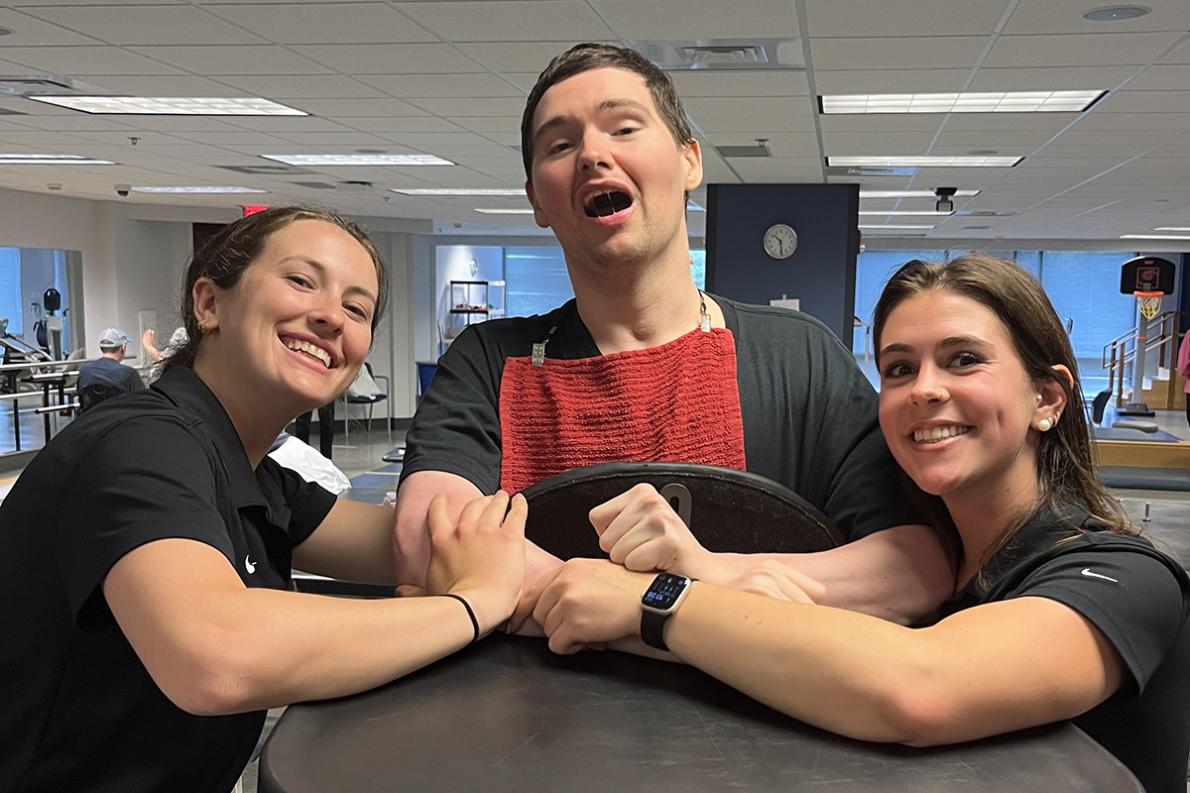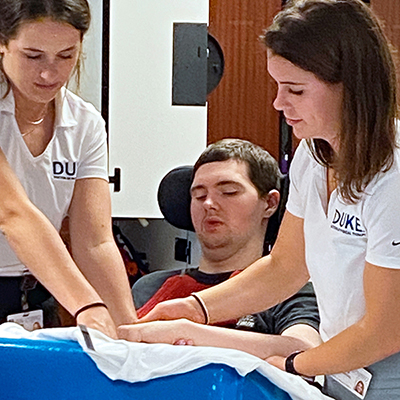A One-in-a-Million Experience at Durham Neuro Camp

Tyler Peaden was one of nine volunteer participants in a spring rehabilitation program hosted by Duke’s Doctor of Physical Therapy (DPT) program. However, saying he was a typical participant would be a significant understatement.
“I fell in love with physical therapy because of the bonds and connections that can be made, and I’ve enjoyed hearing my professors’ stories about special patients that confirmed their love for this field of care,” said DPT student Brynn Gille. “Tyler is that person for me. His willpower, drive, and the overall light he brings into this world have caused my love for the profession to grow.”
The Neuro Camp Experience
Durham Neuro Camp is a one-week intensive rehabilitation program provided during a DPT service-learning advance practice course led by Jody Feld, PT, DPT, PhD, assistant director for interprofessional education and assistant professor of orthopaedic surgery, and Kelly Reynolds, PT, DPT, PhD, assistant professor of orthopaedic surgery. Four faculty members and residents, along with 11 Duke Health and community clinical mentors, including physical, occupational, and speech therapists mentor the students enrolled in the course.
Volunteer participants from the community receive free physical therapy services from the second-year DPT students and their mentors. The participants have neurological diagnoses—in Tyler’s case, a pontine and bilateral cerebellum stroke—and have limited access to rehab or have exhausted their available therapy sessions and continue to have rehabilitation needs and functional goals.
“The opportunity to work out the entire day for five consecutive days” is what Tyler said attracted him to Neuro Camp. “The one-hour sessions I'm used to are just too rushed, and once per week is too sporadic.”
Each participant is matched with two students, and Tyler was matched with Brynn and her classmate, Jordyn Parks. The pair of students admit to being nervous about working with Tyler initially, partially due to the communication barrier. His condition impacts his speech and requires him to communicate with Brynn, Jordyn, and the faculty and clinician mentors using the AEyeOU method, where his eye movements help spell words and give “yes” or “no” responses to questions.
The trio was off and running after an ice-breaker question about college basketball. By the end of the week, they were joking with and advocating for one another during their therapy activities, resulting in a dynamic new friendship that Brynn says was the most rewarding part of her work with Tyler.
“Tyler is truly one in a million. Not only with his diagnosis but also in my heart. Not a day goes by that I don’t think about him and his family.”
Benefits for Participants and Students
For participants, the benefits of Neuro Camp vary based on an individual’s needs and goals.
“Working out all day every day is what I enjoyed the most,” Tyler said.
“He was a bit of a workaholic before his stroke,” Tyler’s mother, Gwen Peaden, said. “Not having daily tasks has been extremely hard for him. He felt a progression during Neuro Camp due to the consistency of the therapy, which excited him.”
It’s a space for students to apply classroom concepts in a hands-on environment. Using what they learned from the didactic portion of the program, Brynn and Jordyn built a personalized plan of care for Tyler using the ICF framework to describe and organize information on functioning and disability.

“Specific to Tyler, there is limited research around chronic bilateral pontine and cerebellar strokes,” Brynn said. “This meant Jordyn and I were challenged to test our foundational knowledge and develop skills to grow a plan of care salient to Tyler and his family.”
“The structure of Neuro Camp gave us the autonomy to try different therapeutic activities and adjust based on how he responded and what he wanted to do at the moment,” Jordyn said. “Our treatments included high-level gait training, transfer practice, strengthening, balance, and stretching. This experience taught me how to use clinical reasoning throughout therapy sessions and how to take the time to listen to your patients to help them achieve their goals.”
“We are very grateful for the opportunity for Tyler to attend this camp,” Gwen said. “Brynn and Jordyn were awesome and helped him so much. I honestly wish that Tyler could continue the experience from that week for the rest of his life.”
Brynn said the need to care for such a unique individual pushed her to be the best student. She plans to incorporate the physical therapy and life skills she learned during Neuro Camp into the care plans for her patients in the future.
“Tyler presents a gap in physical therapy care that must be addressed in future research to align with the goals of our profession. We can offer so much to vulnerable individuals, beginning with us advocating for them. I will advocate for the care of individuals like Tyler for the rest of my career.”